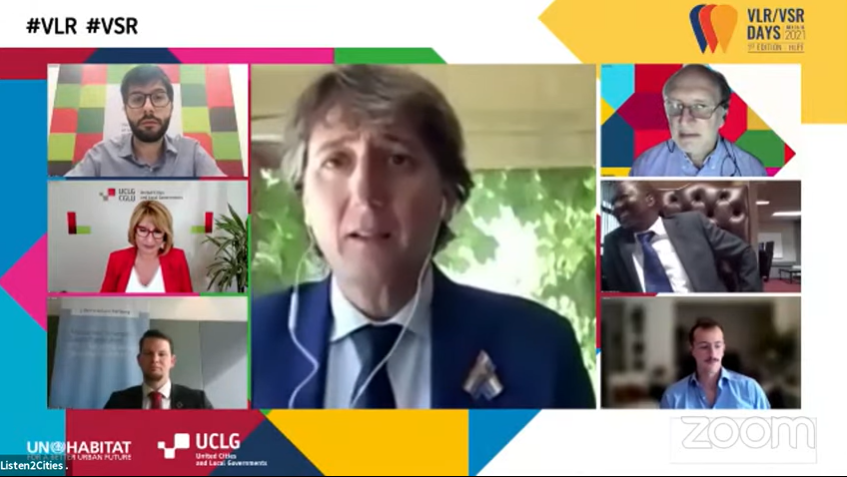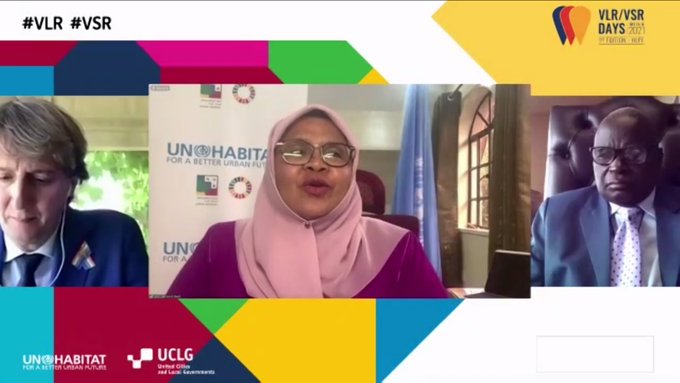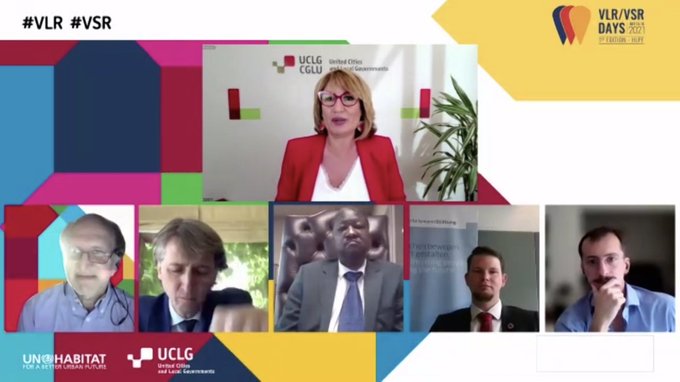Voluntary Subnational Reviews, critical building blocks to achieve the SDGs
21.07.2021
Day 2 of the VLR-VSR days brought together representatives from national governments and from local governments’ associations to exchange on Voluntary Subnational Reviews, as a tool to enhance dialogue between spheres of government as well as ownership of the goals among local and regional governments. The session allowed to present the main findings of the VSRs developed in 2021, and a moment for reflection to enhance subnational involvement in the monitoring of the SDGs, and gathered more than 160 participants.
Opening the session, Carlos Martínez Mayor of Soria, Special Envoy of UCLG for the New Urban Agenda, Maimunah Mohd. Sharif, Executive Director of UN-Habitat, and July Moyo, Minister of Local Government and Public Works of Zimbabwe,  highlighted the importance of the voluntary subnational and local reviews to foster ownership of the goals at local level, as well as the involvement of local governments and their associations in national reporting processes.
highlighted the importance of the voluntary subnational and local reviews to foster ownership of the goals at local level, as well as the involvement of local governments and their associations in national reporting processes.
“Thanks to VSRs we have a much more accurate picture of the reality on the ground, especially in intermediary cities. This reporting lays the groundwork for transformation: to continue reinventing food systems, multilevel governance and the need to address the SDGs by including local governments from the get-go” Carlos Martínez Mayor of Soria, Special Envoy of the UCLG Presidency for the New Urban Agenda
“I believe that VLRs, VSRs and VNRs, if aligned and coordinated, can be powerful tools to enhance policy coherence and the delivery of development policies for our communities, especially in view of promoting a sustainable, resilient and inclusive recovery after the pandemic.” Maimunah Mohd. Sharif, UN-Habitat Executive Director,
“It is important that we bridge the gap between local action and reporting. In Zimbabwe, local authorities are part of our constitution. It makes sure they are the government nearest to the people and the cornerstone of the legislation is the subsidiary principle”. July Moyo, Minister of Local Government and Public Works of Zimbabwe
The panel discussion that ensued, introduced by Edgardo Bilsky, head of research of UCLG, allowed for the countries that had presented VSRs in 2021 to showcase their efforts, the challenges faced, and the steps that need to be taken to achieve full subnational inclusion in reporting processes.
Zimbabwe built on the words of the minister, with Alderman David Guy Mutasa, President of ZILGA, arguing that the relationship between local and national governments is critical to achieve the goals. Devolution funds are not enough in countries that have gaps at the local level built during years. It is important, he stressed, to develop mechanisms that fully connect the local and national level, and to include SDG localization as part of devolution funds.
Norway was represented by Nikolay Astrup, Minister for Local Government and Modernization, and Björn Arild Gram, President of the Norwegian Association of Local and Regional Governments (KS). The VSR, they argued, had contributed to supplement national reporting, and had led to most municipalities in Norway to incorporate the SDGs in their strategies.
“We depend on your efforts, LRGs, if we are to achieve the SDGs by 2030. I am confident that cooperation between spheres of governments will be an important contribution to progress on the SDGs, and hope this VSR will be an inspiration not only to achieve the SDGs in Norway but also in other countries” Nikolay Astrup, Minister for Local Government and Modernization
The VSR from Cape Verde was presented by Herménio Fernandes, President of the National Association of Municipalities of Cabo Verde, and Gilson Gomes Pina, Director of the National Planning Department, who stressed that municipalities had been working with the national government, and laid out the field work done to ensure the VSR was brought to fruition. The need to lessen financial constraints on local and regional governments, who depend on national funds, was highlighted as key to achieve the SDGs at local level.
 Alwis Rustam, Executive Director of the Association of Municipalities of Indonesia (APEKSI) and Vivi Yulaswati, Head of the National SDGs Secretariat of the Ministry of Planning of Indonesia, argued that the Indonesian VSR can strengthen the role of LGAs to support the acceleration of SDG implementation, and how LRGs and their associations can be more proactive when exchanging practices and in collaborating among municipalities, thereby bringing an extra layer of knowledge and being closer to the ground. Collaboration with local and regional governments, both representatives argued, is critical to build resilience and capacities and improve VSR elaboration.
Alwis Rustam, Executive Director of the Association of Municipalities of Indonesia (APEKSI) and Vivi Yulaswati, Head of the National SDGs Secretariat of the Ministry of Planning of Indonesia, argued that the Indonesian VSR can strengthen the role of LGAs to support the acceleration of SDG implementation, and how LRGs and their associations can be more proactive when exchanging practices and in collaborating among municipalities, thereby bringing an extra layer of knowledge and being closer to the ground. Collaboration with local and regional governments, both representatives argued, is critical to build resilience and capacities and improve VSR elaboration.
The VLR from Mexico was introduced by Sergio Arredondo, Secretary General of FLACMA and Alfredo González Reyes, Responsible for the 2030 Agenda of Mexico, highlighting how coordination between the 32 Mexican states (regional governments) had been critical for its preparation. There is still, however, work to do in terms of multilevel coordination, to align subnational work with the SDGs, and it still remains a challenge to ensure funding for LRGs. Subnational reporting efforts, and their involvement in national reports, as was the case with this VSR, can open opportunities for dialogue and coordination.
SALAR, the Swedish Association of Local Authorities and Regions, led the Swedish VSR. Carola Gunnarsson, Mayor of Sala, Vice President of SALAR, and UCLG Vice President for Europe, and Mia Crawford, Deputy Director at the Global Agenda Department, Ministry for Foreign Affairs, showcased some of the conclusion of the Swedish VSR, which is an exception stemming from a decentralized model. The VSR identified 6 areas of work: People and society; Resilience, Participation and Trust; Education and Training; Work and Unemployment; Isolation and Loneliness; Physical activity and healthcare, which build on lessons from the pandemic, and identifies the need for the recognition of including human rights and gender equality at the center of planning, to build back after the pandemic.
Adnen Bouassida, Mayor of Raoued, and President of the National Federation of Municipalities of Tunisia, and Mokhtar Hammami, Former Minister of Local Affairs, showcased how the Tunisian VSR focused primarily on SDGs 12, 6, 7, 11, and 8, and mentioned the need for stronger coordination and for supporting local and regional governments with financial resources. 90% of municipalities have not participated in national mechanisms for monitoring and coordinating, and it is imperative to involve them, in the wake of the pandemic, to ensure real policies of inclusion.
Sabine Drees, Department of European and International Affairs, German Association of Cities (Deutscher Städtetag), and Mark Wolinda, Manager Transfer and Scale, Bertelsmann-Stiftung, addressed the key findings of the German VSRs, building  on the SDG Portal launched by the Deutscher Städtetag. The 56 indicators featured in the portal allow for municipalities in Germany to enable comparisons, and to develop SDG actions and SDG Reports. Some of the key challenges identified were the lack of data for the indicators, especially on SDG 13 and 17, stemming from the lack of measurement for ecological aspects. The need to share responsibilities for the SDGs was also seen as essential in the German VSR.
on the SDG Portal launched by the Deutscher Städtetag. The 56 indicators featured in the portal allow for municipalities in Germany to enable comparisons, and to develop SDG actions and SDG Reports. Some of the key challenges identified were the lack of data for the indicators, especially on SDG 13 and 17, stemming from the lack of measurement for ecological aspects. The need to share responsibilities for the SDGs was also seen as essential in the German VSR.
Secretary General Emilia Saiz highlighted the involvement of UCLG in the VSR process, supporting with expertise and bringing together some of the countries that developed the VSRs, and commended participants for the active participation in the session, and the involvement of the national sphere in the reporting process. Mayor of Soria and UCLG Envoy for the Presidency Carlos Martínez closed the session by sharing how many countries had expressed similar issues when developing the VSRs, and called to develop public policies that could face the challenges that the Decade of Action brings, together with communities.